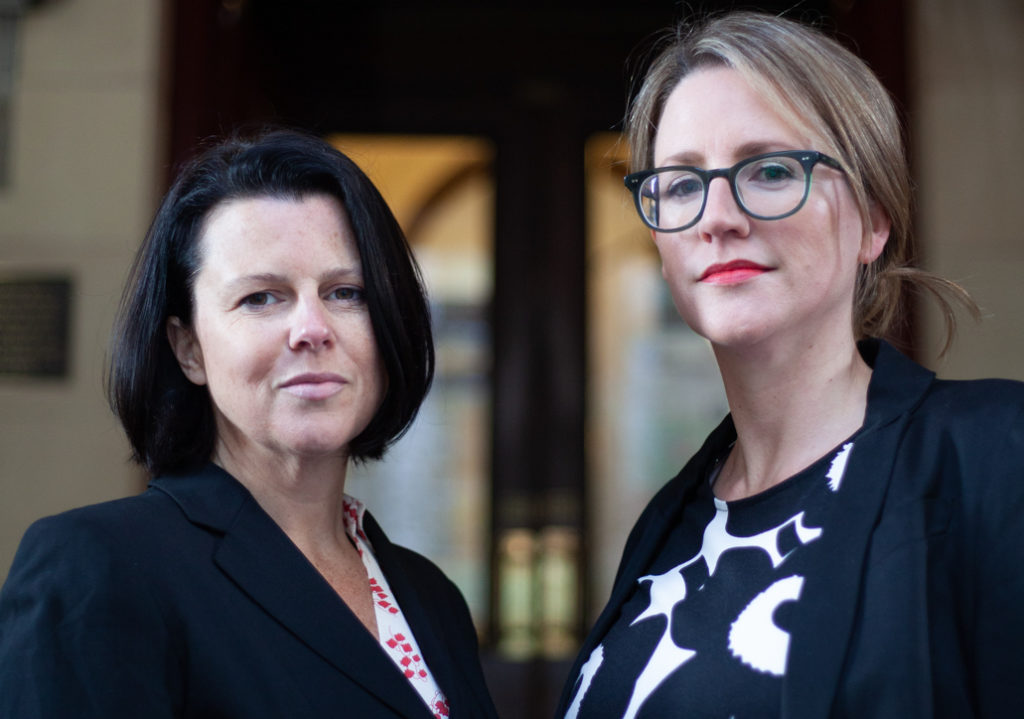Nicola Rivers and Elizabeth McKinnon have been jointly appointed as CEO of Environmental Justice Australia (EJA), one of Australia’s leading public-interest legal organisations.
It’s a unique CEO arrangement in that Elizabeth and Nicola will truly share the role: both being across all aspects of the job but each working part time and aiming to respect the other person’s days off as much as possible.
We’ve been reporting on job sharing arrangements on Women’s Agenda for years, but we’ve (anecdotally) seen little growth in what I thought would be a growing trend — although have highlighted some key arrangements, including at the ACCC, where Morag Bond and Kate Reader jointly shared the general manager role on a high profile inquiry.
And while it is increasingly common to see co CEOs working on startups, it’s much more unusual to see joint appointments occurring within more established organisations.
That’s despite job sharing presenting incredible opportunities for flexibility, and organisations directly benefitting from having two brains at their helm. And it’s despite job sharing becoming increasingly more possible, given the collaboration and project management tools so readily available.
Successful job sharing arrangements and appointments are appealing, and the fact that announcements regarding these appointments generate such a positive reaction is particularly telling. When Temple Executive Search Director Rebecca Tabakoff posted about two women applying jointly for a role and successfully landing the job last week, the post received more than 4000 likes and thousands of comments
(The successful applicants have since been in touch, and we’ll be hearing from them shortly on Women’s Agenda).
Jointly leading for environmental justice
Together, Nicola and Elizabeth bring a combined 32 years of experience to their role — something that may have been a little more challenging to find in the appointment of one person. They share a wide range of experience covering litigation, law reform and in house counsel.
As outgoing CEO Brendan Sydes says: “Both of these accomplished women would be wonderful organisational leaders on their own. As a combination they will be formidable.”
In the legal sector, which has long been known to be female-dominated at the junior level but then male-dominated at the senior end, and has a number of structural issues that stand in the way of women’s success, job sharing presents more opportunities for women to work how they need.
Elizabeth and Nicola started considering the idea of a joint CEO model over lunch around two years ago, after discussing the predicament women find around wanting to move into more senior positions, but still needing to work part time.
Nicola was initially skeptical about the idea of job sharing, but saw the success of such appointments in other organisations — including at the Consumer Action Law Centre.
“Elizabeth and I were both ready to step up to a CEO position but we have young kids and choose to work part time while they’re little,” she says.
They proposed a joint leadership model as co-CEOs and then underwent the interview process together.
“I didn’t think the stars would align to actually make it happen, especially when Elizabeth became pregnant with her second bub. Her baby was about 2 months old when our CEO resigned which was not great timing to say the least, but Elizabeth was keen and committed to it.
“The three-month EJA interview process happened during COVID lockdown, with Elizabeth home with a newborn and toddler and me home-schooling and working from home. It was hectic, but we’re both very determined people and we made it happen.”
They now hope the arrangement will encourage other women — and their employers — to see the benefits of job sharing.
“It’s always seemed to me that parents (mostly women) returning to work after having babies are faced with one of two problematic scenarios,” says Elizabeth.
“Firstly, Here’s your old 5 day a week job back – for you to do 3 days a week. Or secondly, you can’t do your own job part time but here is some ‘project work’ – (which turns out to be something that is flexible and undemanding but is also unchallenging and essentially a demotion). In neither case is the woman in a position where her career progresses during the period of her life that she may want to work part time.”
But not only is this a win for two women who need to work flexibly, it’s also a win for the organisation.
“Co-leadership of EJA will significantly strengthen both the organisation and the broader environment movement,” says Elizabeth.
“It means two sets of skills, experiences, networks and passions,” adds Nicola. “It also means high quality decision making, super-charged brain power and elevated energy at the senior ranks of EJA. And it sets a positive example for our organisation, our movement and the broader public about female leadership and job-sharing at the leadership level.”
It’s set to be a busy period at EJA, and Elizabeth adds that there will, unfortunately, never be a shortage of opportunities to litigate.
“Especially when governments and big industry continue to breach our environment laws and put our forests, rivers threatened wildlife and communities at risk,” she says.
“Though there are huge challenges in getting citizen-led cases into court in Australia, they are critical to run. When governments fail in their duty to protect our environment, it’s often left up to the community to do that work. I look forward to working with EJA’s new and existing clients who always show great conviction, courage and perseverance in protecting nature for their kids and grandkids.”


